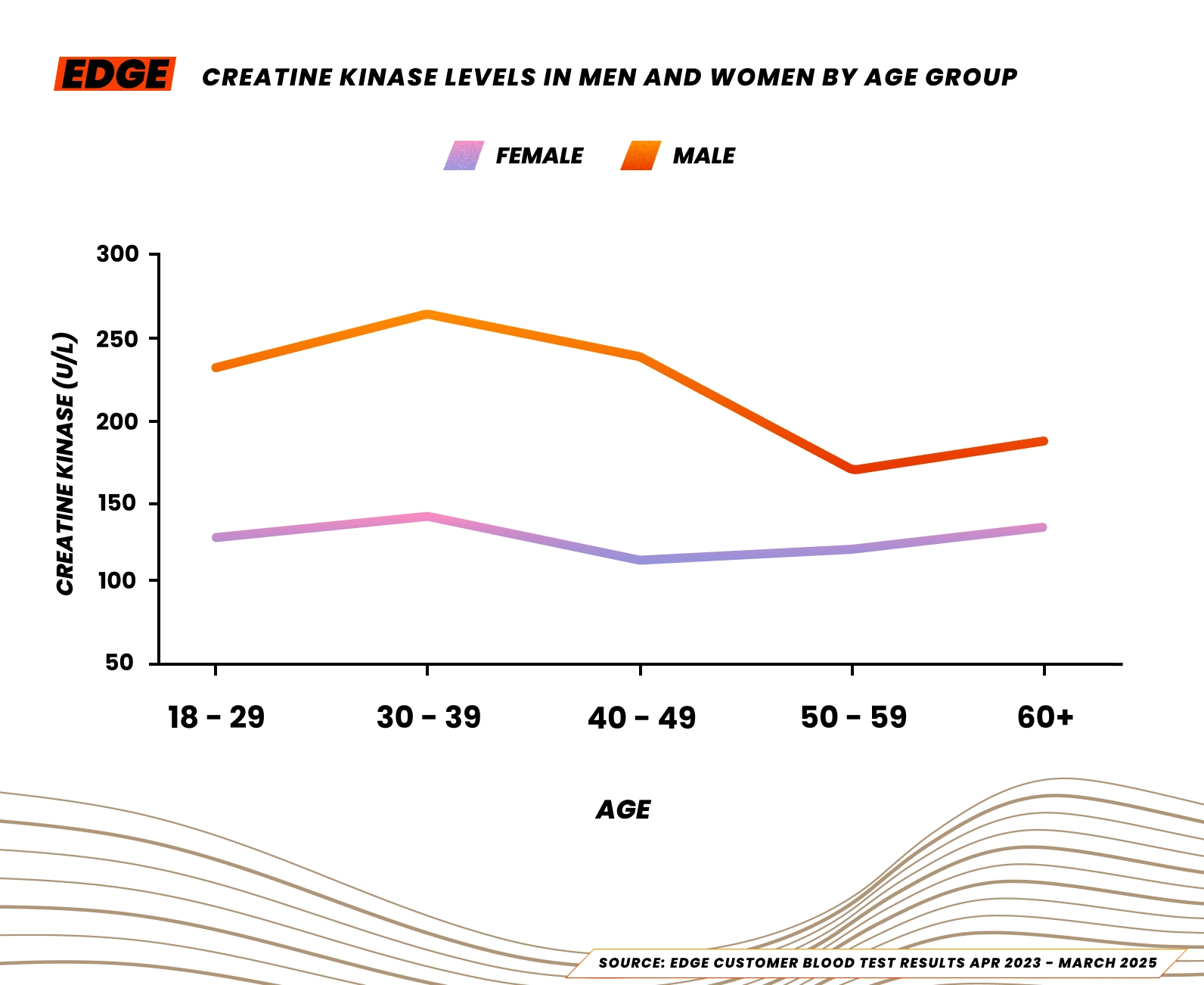What is Creatine Kinase & why is it important for athletes?
1 min read
Published on
May 22, 2025
Written by
EDGE
Share this article
What Is Creatine Kinase?
Creatine kinase (CK) is an enzyme released into the blood when muscle tissue is damaged. It’s a key marker for muscle stress and recovery, helping athletes understand how their body is responding to training loads.
While elevated CK levels after intense workouts are normal, persistently high levels may point to overtraining, inadequate recovery, or muscle strain — all of which can compromise performance and increase injury risk.

"Creatine Kinase is a marker of muscle damage. Elevated levels are common after intense training or competition. It’s sometimes useful in the post-competition phase to check that CK has returned to baseline before increasing training load again. And persistently high readings can indicate overtraining or inadequate recovery. I recommend testing after deload weeks or rest periods to establish a baseline, and then as needed during high-volume blocks. Including hs-CRP and urea in the panel helps distinguish between muscular stress, systemic inflammation and metabolic strain."
CK and Muscle Damage
CK is found in skeletal muscle, the heart, and the brain. For athletes, it’s primarily relevant as a measure of skeletal muscle breakdown. When muscles are pushed to their limits — during weightlifting, sprinting, or long-distance events — tiny tears occur, releasing CK into the bloodstream.
A temporary rise in CK is part of the normal adaptation process. But if levels stay high, it may mean the body isn’t recovering properly.
What are normal creatine kinase levels for athletes?
We looked at blood test data from EDGE customers and found the median albumin levels for men and women are 131 U/L and 230 U/L, respectively.
Here is a breakdown of creatine kinase levels by age and gender:
| Table 1: Creatine Kinase Levels in Men and Women by Age Group (U/L) | ||
| Age Group | Female | Male |
| 18-29 | 129 | 235.5 |
| 30-39 | 142 | 263 |
| 40-49 | 116 | 241 |
| 50-59 | 122 | 168.5 |
| 60+ | 136.5 | 182 |
Source: EDGE customer blood test results Apr 2023 – March 2025.
The labs we used to analyse blood samples state a healthy range for creatine kinase is generally between 25-200 U/L for women and 40-320 U/L for men.

Why It’s Important to Monitor
-
Track Muscle Recovery
Testing CK helps athletes gauge when they’ve recovered from intense sessions. Returning to high-load training too soon can lead to fatigue or injury.
-
Avoid Overtraining
Chronically elevated CK is a red flag for overtraining, which can lead to reduced performance, fatigue, and increased injury risk.
-
Personalise Training
Athletes vary in how quickly they recover. CK data allows for a more individualised approach to training intensity and recovery periods.
-
Detect Underlying Injury
Sudden spikes in CK without a known training cause may indicate muscle trauma or underlying issues such as rhabdomyolysis (serious muscle breakdown).
What Influences CK Levels?
-
Training Volume & Type – Eccentric exercises (e.g. downhill running, heavy lifting) cause more muscle microtrauma, leading to higher CK levels.
-
Training Age – Well-trained athletes may have lower baseline CK responses due to improved muscular efficiency.
-
Genetics – Some individuals naturally release more CK from muscle tissue than others.
-
Sex – Men typically have higher CK levels than women, partly due to greater muscle mass.
When Should Athletes Test CK?
-
After a heavy training block or competition
-
When experiencing delayed recovery, soreness, or fatigue
-
To establish a personal CK baseline and monitor deviations
-
As part of a recovery-focused blood test routine
-
Post competition phase to monitor recovery
How to Lower High CK Levels
-
Increase rest and active recovery days
-
Prioritise sleep and proper nutrition
-
Include anti-inflammatory foods like berries, leafy greens, and omega-3-rich fish
-
Stay hydrated to support kidney clearance of CK
-
Avoid training through soreness if recovery is incomplete
In Summary
-
CK is a direct marker of muscle stress and damage
-
Testing helps optimise recovery, reduce injury risk, and personalise training
-
High CK doesn’t always mean danger, but knowing your baseline helps you interpret changes more accurately
Check Your CK Levels
Want to train harder and recover better? Start by testing your CK levels — and give your body the balance it needs to thrive.
Get 10% off your first order
Want regular tips on how to make the most of your results? Join our newsletter and we'll give you 10% off your order!
Get the knowledge
Get expert advice to help you improve your results.
Go to our knowledge center


